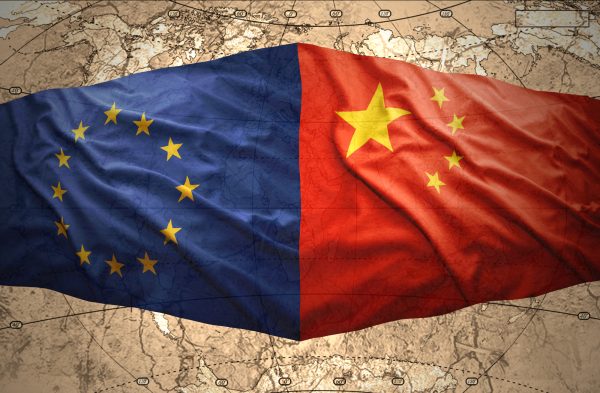China Energy | Economic system | East Asia
The 2020 deal, already on ice, is perhaps lastly lifeless after China’s refusal to sentence the Russian invasion of Ukraine.
“We all know we’re in an advanced section of relations with China,” European Union commerce chief Valdis Dombrovskis stated just lately, referencing the upcoming April 1 digital summit between Brussels and Beijing. The summit arrives at an inopportune and awkward time for either side. Russia’s current invasion of Ukraine and China’s reluctance to sentence it has induced the EU’s 27 member states to “rethink” their ties with Beijing inside a “new world context.” Because of this, ratification of the beforehand much-hailed EU-China Complete Settlement on Funding (CAI) appears much less sure than ever and sure is not going to happen anytime quickly.
The chilly sentiment is mutual. Amid political tensions with the West, Beijing has bolstered financial ties nearer to dwelling, most notably with the Regional Complete Financial Partnership (RCEP) – arguably the most important free commerce deal in world historical past – projected so as to add $500 billion to world commerce by 2030. In a speech earlier this March asserting his annual work report back to lawmakers, Chinese language Premier Li Keqiang made no point out of commerce offers with the USA or the EU, a notable departure from the previous three years. The report itself additionally didn’t talk about commerce with the USA.
The EU-China funding settlement has undergone a rocky journey since negotiations concluded in December 2020. On the time, members of each the outgoing Trump and incoming Biden administrations in the USA criticized the deal, arguing that it didn’t sufficiently handle China’s use of pressured labor, amongst different points. Ratification of the settlement unraveled shortly afterward, beginning in March 2021 when the EU sanctioned 4 Chinese language officers concerned with internment camps in Xinjiang. Beijing responded by imposing a raft of retaliatory sanctions in opposition to completely different EU officers and businesses, which led Brussels to formally droop ratification talks that Might. Again then, Dombrovskis stated, “We can not ignore the broader context of relations between the EU and China.”
Because the April 1 summit nears, the bilateral relationship between Brussels and Beijing has solely worsened. Final week, diplomats convened in Brussels to debate an agenda for the upcoming summit: The highest problem was Russia’s assault on Ukraine and never if, however how, to persuade China to assist Ukraine. One other outstanding problem might be China’s imposition of coercive sanctions in opposition to EU member state Lithuania over the latter’s choice to open a Taiwanese consultant workplace, which has since resulted in a lawsuit in opposition to Beijing on the World Commerce Group.
To make issues worse, the funding deal’s largest proponent in Europe, German Chancellor Angela Merkel, has since stepped down, additional propelling the landmark EU-China funding deal into the dustbin of political infeasibility.
The present floundering of the EU-China funding treaty marks a fast fall from grace. Earlier than, many observers pointed to the settlement as a win for Beijing that will safe continued EU funding in China and thwart Washington’s efforts to dam Beijing from the worldwide commerce regime. Again in 2020, Chinese language President Xi Jinping personally intervened on the final minute to supply concessions over market entry and save the deal, highlighting its significance to the Chinese language authorities. Xi praised the pact as nurturing a “brighter future for cooperation” with Europe. The EU described the deal as “essentially the most formidable settlement that China has ever concluded with a 3rd nation,” lauding its complete guidelines in opposition to pressured expertise switch and necessities for elevated transparency on subsidy and sustainability commitments. Now, such rhetoric looks as if platitudes from a bygone period.
Vladimir Putin’s invasion of Ukraine and China’s unwillingness to cease it is going to be the hill upon which the EU-China funding settlement dies – a minimum of for now. Up to now, it appears like “the very best scenario is a China that’s impartial to barely unhelpful,” stated Ben Rhodes, a former official within the Obama administration. U.S. President Joe Biden’s current video name with Xi, whereas prolonged, didn’t change a lot – Beijing nonetheless refuses to make use of the time period “invasion.” Worse, EU leaders reportedly possess “very dependable proof” that China is significantly contemplating offering army help to Russia.
Whereas the funding deal is not going to progress within the close to future, this doesn’t imply the EU will decouple and diversify away from Beijing in a single day, though Brussels has launched plans to cut back such dependencies. The bloc of 27 member states stays China’s largest buying and selling companion, exchanging $709 billion price of products and companies in 2021, and critically is dependent upon Chinese language imports in 103 product classes throughout the digital, chemical, mineral, and pharmaceutical industries. “Don’t overlook that there’s a lot at stake economically” in Europe’s commerce relations with China, Steven Blockmans of the Centre for European Coverage Research instructed POLITICO.
Nonetheless, the query of whether or not the EU-China funding settlement stands an opportunity at ratification anytime quickly will hinge upon Beijing’s subsequent steps relating to Russia. And the early indicators are lower than promising.

